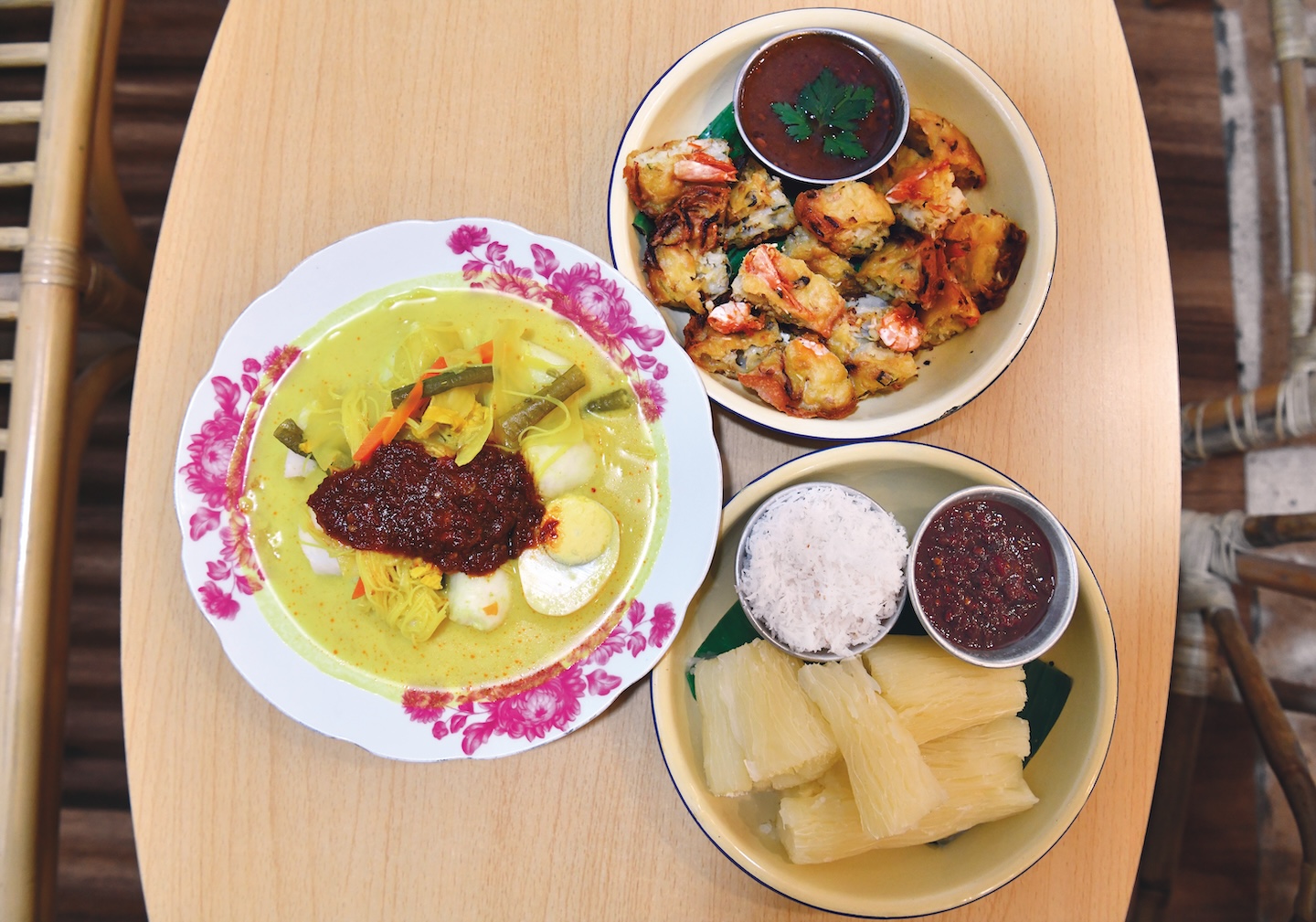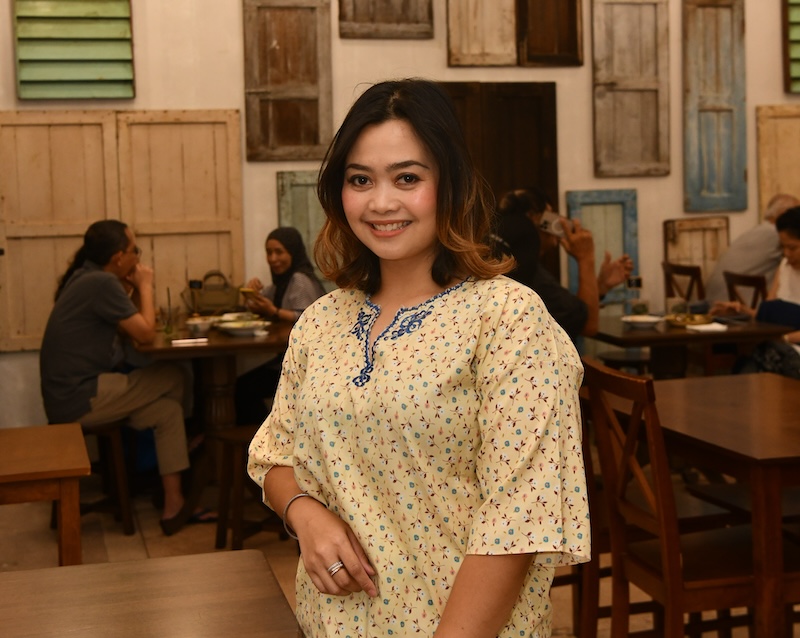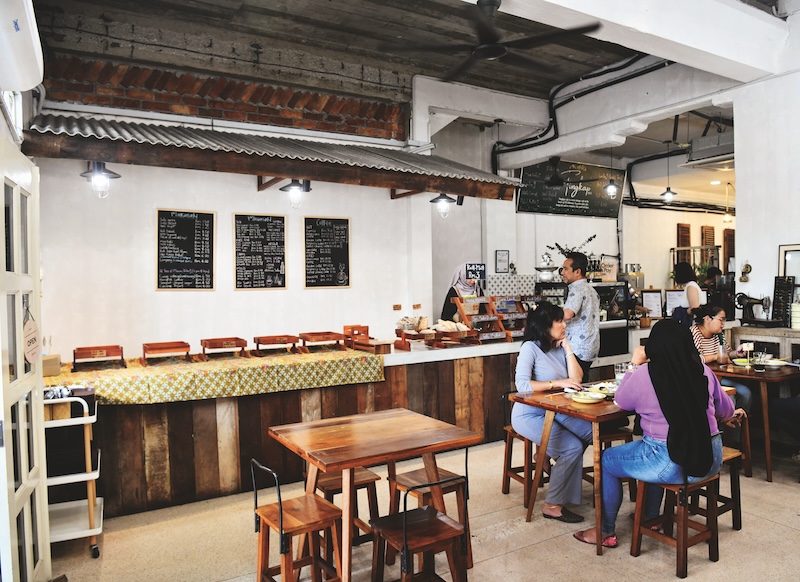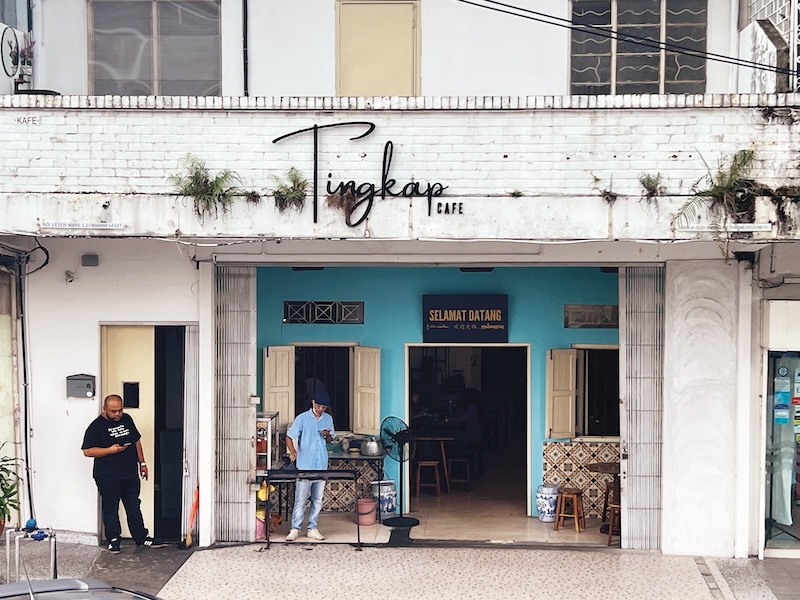
The traditional Malay dishes feature Adila’s own recipes (All photos: Shahrin Yahya/The Edge Malaysia)
What do people need? In any given situation, good or bad, it’s always food. Food comes first,” says Nurul Adila Redzuan, founder of Tingkap Café, located in PJ Old Town, the oldest urban area in Petaling Jaya, Selangor.
The 34-year-old’s foray into the food and beverage industry began a long time ago while still a teenager, fuelled by her drive to survive financially. “I was thinking about something I could do that would be sustainable in the long run. It was not so much about having an interest in cooking or baking but about wanting to have a business that could be a source of livelihood. I asked myself, ‘What can you do to survive and that will survive in the long term?’”
She began selling tepung pelita (a local dessert made from rice flour, coconut cream and pandan) during Ramadan and the venture continues until today. “At the time, tepung pelita was just starting to gain in popularity. Not many people were selling it yet. So I thought, why don’t I try? And it did well.”
After leaving her job as a make-up artist to be a full-time housewife, she had more time to think about her dreams and future. When the pandemic hit, she sold meatballs to family and friends who were craving Ikea’s signature dish. This reaffirmed her belief that cooking and food can help her earn a living, even in times of uncertainty. “So, we decided to stay the course lah. And I have always wanted to set up a café.”
20241203_peo_tingkap_cafe_msy_18.jpg

Although she had had years of experience in the business by then, launching a restaurant was not a decision made lightly. “We understood that it came with risks. In fact, anything you do comes with risks. So, you need to have plans B and C in case plan A does not work out.”
Adila and her husband took their time researching the market and concepts, developing the menu as well as looking around for a suitable location. They chanced upon a two-storey shophouse that was up for sale in the charming neighbourhood of PJ Old Town — it was time to put their plans into action.
In February last year, Tingkap Café opened its rustic doors to customers from a range of demographics. While most newly established eateries these days adopt a modern minimalist design, Tingkap stands out with its classic concept that speaks to the older generation or city dwellers who reminisce the beauty of village culture in Malaysia. The set-up may lack the peaceful and scenic rural landscapes, being situated in such a busy district, but it more than makes up for that with its well-thought-out interiors and menu offerings.
Adila explains the reason for the restaurant’s pure traditional theme when others opt for contemporary styles and international cuisines. “A restaurant with this kind of concept, it’s hard to cari tengah bandar. Customers, especially the elderly, find this place very nostalgic. The young ones, on the other hand, are curious when they spot the vintage objects we place around the shop because it is their first time seeing those things,” she chuckles.
20241203_peo_tingkap_cafe_msy_12.jpg

The façade makes for a welcoming entrance, with a double wooden door flanked by two windows unlatched to reveal a roomy dining area. Able to seat up to 80 people at a time, the space is furnished with wooden furniture and enhanced with antique finds such as old newspaper cutouts, a hefty satellite television, sewing machine, typewriter and abacus, among others.
But its focal point is none other than, as its name suggests, the collection of tingkap (“windows” in Malay) that draw one’s attention straight to the walls. “It reminds you of that sentimental feeling and tenderness of being welcomed by your loved ones when you go back to your kampung.” These unique decorations were picked and acquired directly from Adila’s hometown of Bagan Serai, Perak.
When it comes to food, the owners started by offering a small number of mains on their menu to test the waters and observe if customers would be able to accept them. “At the beginning, we were serving lontong, lempeng and ubi kayu. Based on constant feedback, we continued to add more dishes to the menu.” Among the delectable choices available all day are Pulut Kuning and Rendang Ayam, Roti Jala with Kari Ayam, Ubi Kayu Rebus served with Sambal Tumis and Kelapa Parut, and Nasi Kerabu and Nasi Dagang sourced directly from Kelantan.
A must-try is Sate Daging and Ayam. “It is unusual for people in the Klang Valley or other parts of the country to eat sate in the morning,” says Adila. “But my husband is from Muar, Johor, and Muar people eat sate for breakfast. The creation of this café is not just to cater for the crowd, but it is also for us to share about ourselves and what we like to our customers.”
20241203_peo_tingkap_cafe_msy_1.jpg

Loyal patrons keep coming back for more. “After some time, they asked if we could do a lunch menu as well. So, we began serving nasi berlauk, which was available on weekends only. Upon request, it is now offered all week.”
The food is prepared fresh in the restaurant’s kitchen and the recipes are all developed by Adila. “I always remind our cooks not to simply tweak the method or ingredient because we want to maintain the consistency and quality. It does not really matter who does the cooking. To me, the recipe is the most important.”
The café provides catering services for a range of events including birthday parties, home buffets and corporate affairs. At the moment, only the ground floor is completely utilised for day-to-day operations, but the whole building can be rented and transformed into an event space.
Although Tingkap is just approaching its second anniversary, the place is already a treasure among those looking to sample traditional Malay cuisine in this bustling city. Adila hopes she can expand the establishment to more locations and attract a wider crowd. “If there is an opportunity, we will definitely grab it. I want to open more places like this in the future, so warga emas who live in town have a spot macam kedai lama they can head to for secawan kopi. It is also a chance for the younger generation to find out what the restaurant scene was like back in the day.”
This article first appeared on Dec 16, 2024 in The Edge Malaysia.


